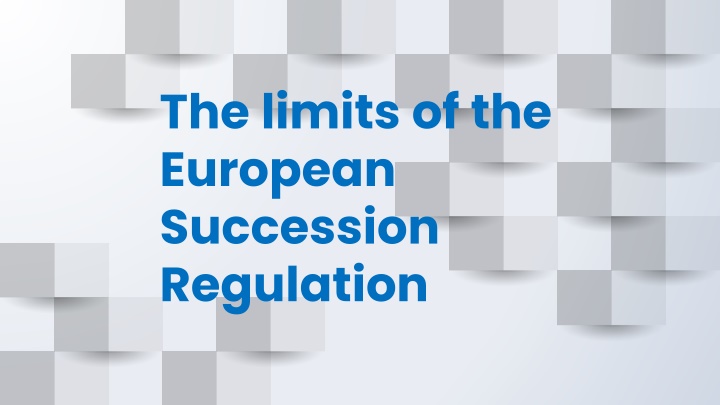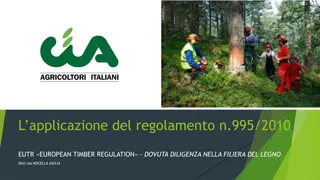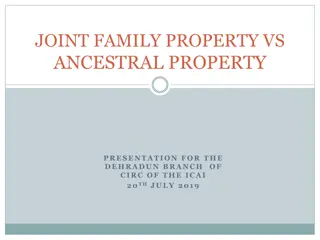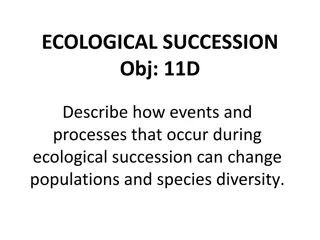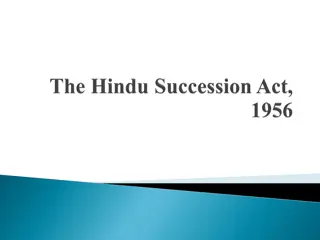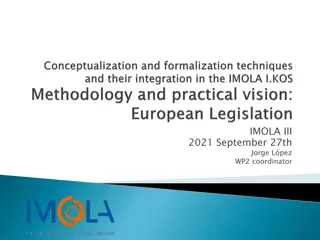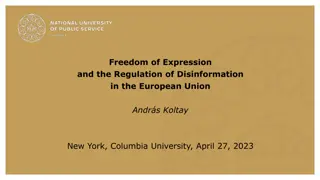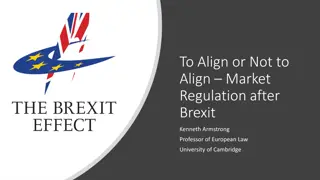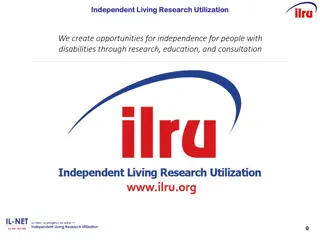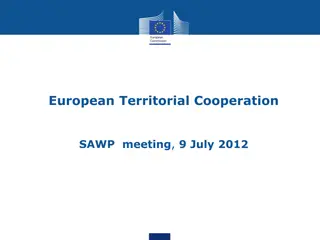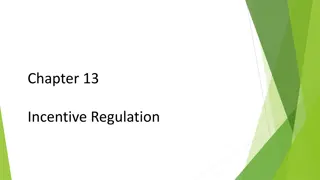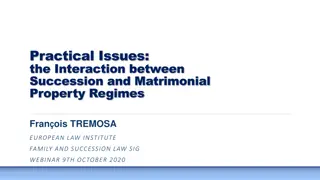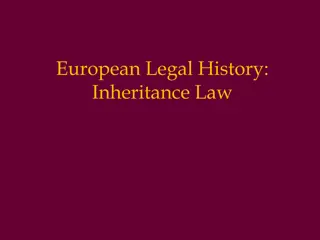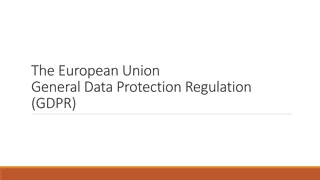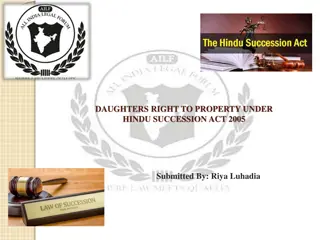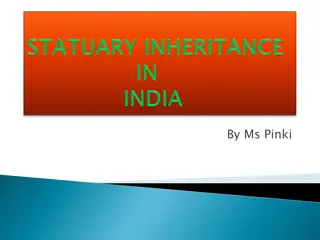European Succession Regulation: Understanding its Scope
The European Succession Regulation aims to facilitate the free movement of persons with cross-border succession implications in the European area of justice. It covers aspects like uniform rules of international jurisdiction, conflict-of-laws system, recognition of foreign decisions, and the European Certificate of Succession. The regulation does not apply to revenue, customs, or administrative matters, focusing solely on succession issues for deceased persons. Certain areas of civil law are explicitly excluded. The goal is to ensure the effective organization of succession rights and guarantees for all involved parties.
Download Presentation

Please find below an Image/Link to download the presentation.
The content on the website is provided AS IS for your information and personal use only. It may not be sold, licensed, or shared on other websites without obtaining consent from the author.If you encounter any issues during the download, it is possible that the publisher has removed the file from their server.
You are allowed to download the files provided on this website for personal or commercial use, subject to the condition that they are used lawfully. All files are the property of their respective owners.
The content on the website is provided AS IS for your information and personal use only. It may not be sold, licensed, or shared on other websites without obtaining consent from the author.
E N D
Presentation Transcript
The limits of the European Succession Regulation
Good morning! Anabela Susana de Sousa Gon alves Associate Professor at the School of Law University of Minho 2
1. The European Succession Regulation
- Uniform rules of international jurisdiction (Chapter II) - Uniform conflict-of-laws system (Chapter III) - System for the recognition and enforcement of foreign decisions, authentic instruments and court settlements (Chapters IV and V) - European Certificate of Succession (Chapter VI)
Recital 7: The proper functioning of the internal market should be facilitated by removing the obstacles to the free movement of persons who currently face difficulties in asserting their rights in the context of a succession having cross-border implications. In the European area of justice, citizens must be able to organise their succession in advance. The rights of heirs and legatees, of other persons close to the deceased and of creditors of the succession must be effectively guaranteed . 5
2. Material scope
Article 1 Scope 1. This Regulation shall apply to succession to the estates of deceased persons. It shall not apply to revenue, customs or administrative matters. 7
Article 3, Section 1 For the purposes of this Regulation: (a) succession means succession to the estate of a deceased person and covers all forms of transfer of assets, rights and obligations by reason of death, whether by way of a voluntary transfer under a disposition of property upon death or a transfer through intestate succession; 8
Recital 11 This Regulation should not apply to areas of civil law other than succession. For reasons of clarity, a number of questions which could be seen as having a link with matters of succession should be explicitly excluded from the scope of this Regulation . 9
Article 1 . 2. The following shall be excluded from the scope of this Regulation: (a) the status of natural persons, as well as family relationships and relationships deemed by the law applicable to such relationships to have comparable effects; (b) the legal capacity of natural persons, without prejudice to point (c) of Article 23(2) and to Article 26; (c) questions relating to the disappearance, absence or presumed death of a natural person; 10
Proposal for a Council regulation on jurisdiction, applicable law, recognition of decisions and acceptance of authentic instruments in matters of parenthood and on the creation of a European Certificate of Parenthood, COM(2022) 695 final Brussels, 7.12.2022 11
Article 1 . 2. The following shall be excluded from the scope of this Regulation: (d) questions relating to matrimonial property regimes and property regimes of relationships deemed by the law applicable to such relationships to have comparable effects to marriage; 12
Council Regulation (EU) 2016/1103 of 24 June 2016 implementing enhanced cooperation in the area of jurisdiction, applicable law and the recognition and enforcement of decisions in matters of matrimonial property regimes (European matrimonial property regimes); Regulation on Council Regulation (EU) 2016/1104 of 24 June 2016 implementing enhanced cooperation in the area of jurisdiction, applicable law and the recognition and enforcement of decisions in matters of the property consequences of registered partnerships 13
Recital 72: The objectives of this Regulation, namely the free movement of persons in the Union, the opportunity for spouses to arrange their property relations in respect of themselves and others during their life as a couple and when liquidating their property, and greater predictability and legal certainty, cannot be sufficiently achieved by the Member States, but can rather, by reason of the scale and effects of this Regulation, be better achieved at Union level, where appropriate by means of enhanced cooperation between Member States. In accordance with the principle of subsidiarity as set out in Article 5 of the Treaty on European Union, the Union has therefore competence to act. In accordance with the principle of proportionality set out in that Article, this Regulation does not go beyond what is necessary in order to achieve those objectives. 14
Article 3 1. For the purposes of this Regulation: (a) matrimonial property regime means a set of rules concerning the property relationships between the spouses and in their relations with third parties, as a result of marriage or its dissolution; 15
Article 4 Jurisdiction in the event of the death of one of the spouses Where a court of a Member State is seised in matters of the succession of a spouse pursuant to Regulation (EU) No 650/2012, the courts of that State shall have jurisdiction to rule on matters of the matrimonial property regime arising in connection with that succession case. 16
Article 1 2. The following shall be excluded from the scope of this Regulation: (e)maintenance obligations other than those arising by reason of death; (f)the formal validity of dispositions of property upon death made orally; (g)property rights, interests and assets created or transferred otherwise than by succession, for instance by way of gifts, joint ownership with a right of survivorship, pension plans, insurance contracts and arrangements of a similar nature, without prejudice to point (i) of Article 23(2); (h)questions governed by the law of companies and other bodies, corporate or unincorporated, such as clauses in the memoranda of association and articles of association of companies and other bodies, corporate or unincorporated, which determine what will happen to the shares upon the death of the members; 17
Article 1 2. The following shall be excluded from the scope of this Regulation: (i) the dissolution, extinction and merger of companies and other bodies, corporate or unincorporated; (j) the creation, administration and dissolution of trusts; 18
Article 1 2. The following shall be excluded from the scope of this Regulation: (k) the nature of rights in rem; and (l) any recording in a register of rights in immovable or movable property, including the legal requirements for such recording, and the effects of recording or failing to record such rights in a register. 19
Recital 15 This Regulation should allow for the creation or the transfer by succession of a right in immovable or movable property as provided for in the law applicable to the succession. It should, however, not affect the limited number ( numerus clausus ) of rights in rem known in the national law of some Member States. A Member State should not be required to recognise a right in rem relating to property located in that Member State if the right in rem in question is not known in its law. 20
Recital 18 The Regulation should constitute a valid document for the recording of succession property in a register of a Member State. This should not preclude the authorities involved in the registration from asking the person applying for registration to provide such additional information, or to present such additional documents, as are required under the law of the Member State in which the register is kept, for instance information or documents relating to the payment of revenue. The competent authority may indicate to the person applying for information or documents can be provided. European Certificate of Succession issued under this registration how the missing 21
Article 23, Section 2 The scope of the applicable law 1. The law determined pursuant to Article 21 or Article 22 shall govern the succession as a whole. 2. That law shall govern in particular: (e) the transfer to the heirs and, as the case may be, to the legatees of the assets, rights and obligations forming part of the estate, including the conditions and effects of the acceptance or waiver of the succession or of a legacy; 22
Conclusions It is impoetant to know the limits of the Regulation However, there is space for improvement 23
Thank you! Any question: asgoncalves@direito.uminho.pt 24
